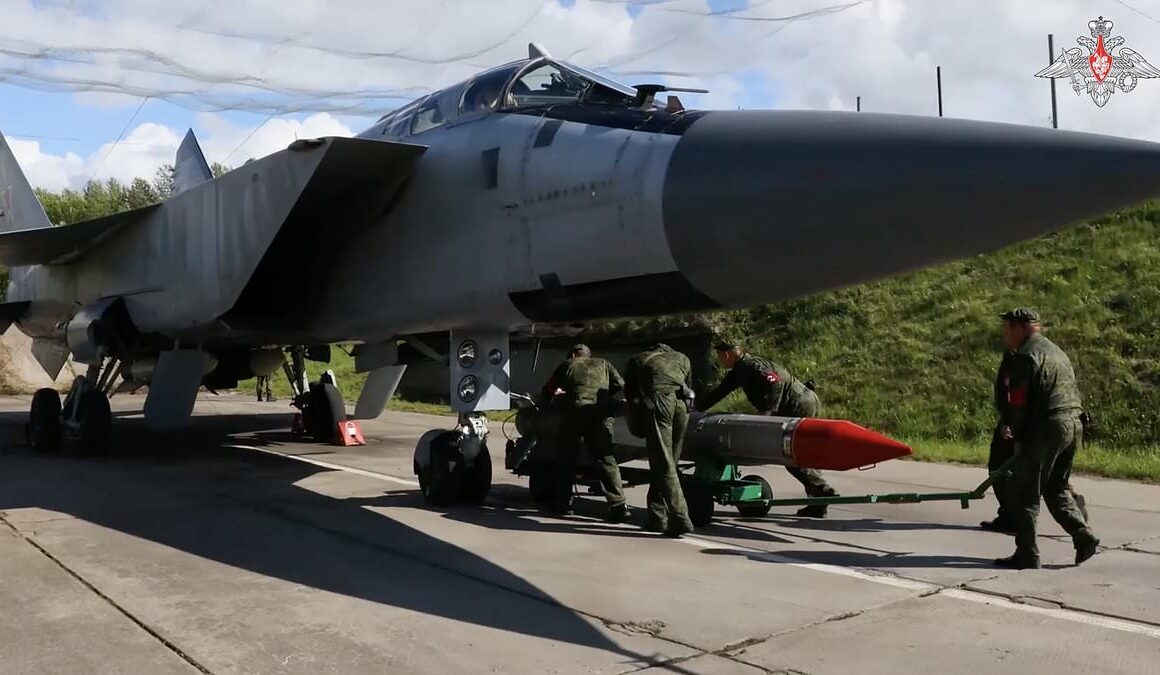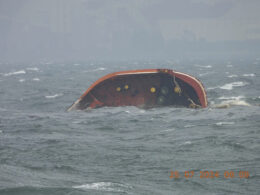Russian troops practiced installing dummy warheads onto launchers in the latest nuclear weapons drills intended as a threat to the West over its support for Ukraine.
Footage showed a military unit armed with Iskander-M operational-tactical missile systems carrying out the third stage of exercises ordered by Vladimir Putin.
The Russian Defence Ministry said the drills would prepare the army and air force for the combat use of non-strategic nuclear weapons.
This includes equipping launch vehicles with missiles ‘and covertly advancing to designated position areas in preparation for conducting electronic launches’.
Last week, Putin’s forces carried out nuclear drills with hulking Yars mobile missile launchers, each carrying warheads with a force six times the strength of the bomb dropped on Hiroshima in 1945.

Russian armed forces carry out drills involving a MiG-31 aircraft and missiles

The missiles are capable of carrying nuclear or conventional warheads

The drills aim to prepare the army and air force for the combat use of nuclear weapons

A Russian nuclear-capable Iskander-M missile fired from a mobile launcher, undated

Russian units carried out the third stage of exercises designed to prepare for nuclear war

This includes equipping launch vehicles with missiles ‘and covertly advancing to designated position areas in preparation for conducting electronic launches’
The Interfax news agency reported that missile launcher crews were set to move over 100km to practice camouflage and deployment techniques. The systems can also be mounted on truck carriers or deployed in silos.
Naval forces carried out similar drills last month, practicing ‘hitting the button’ on a warship believed to be in the Baltic Sea.
The drills came as the US announced fresh sanctions against the Kremlin, prompting Russia‘s deputy chairman of the Security Council Dmitry Medvedev to declare that Moscow should inflict ‘maximum harm on the USA and their ‘f***king allies’ as tensions escalate between Russia and Ukraine’s foreign backers.
The Iskander-M used in the most recent drills is a short-range ballistic missile system with the capability to carry both conventional and non-strategic – or battlefield – nuclear warheads.
One of the most advanced tactical missile systems in Russia’s arsenal, it has a range of 250-310 miles, reaching speeds of up to Mach 6-7.
Conventional versions of the missile have been used in Ukraine.
Troops were also seen loading a missile onto a MiG-31 as part of the drills.
Moscow has claimed Putin ordered the drills tactical nuclear drills to ‘cool the hot heads in Western capitals’.
It followed French President Emmanuel Macron hinting at sending European troops to fight in Ukraine earlier this year.
Former British Foreign Secretary Lord Cameron also said Kyiv had the right to use weapons provided by London to strike targets inside Russia.
Both statements infuriated warmonger Putin who is struggling to make significant progress in his invasion of Ukraine.
Since then, the US has permitted Kyiv to use American missiles to attack border region targets inside Russia used to hit Ukraine.
Russian ally Belarus has also been involved in the tactical nuclear tests.
Putin supplied Belarus with such weapons.
Russian defence ministry channel Zvezda said: ‘The Kremlin has repeatedly noted that the nuclear manoeuvres were a response to harsh Western rhetoric in Ukraine and NATO’s eastward expansion.
‘After Finland and Sweden joined the North Atlantic Alliance, our borders with the military bloc hostile to Russia expanded.’
In the latest clash, the Kremlin said today that any F-16s delivered to Ukraine by allies would be shot down and have little impact on the battlefield, in response to reports that the first fighter jets have arrived.
‘Their number will gradually decrease, they will be shot down… But of course, these deliveries will not have any significant impact on the development of events on the front,’ Kremlin spokesman Dmitry Peskov said.
For more than two years, Ukraine has pleaded with Western allies for the US-made fighter jets – long considered the crown jewel in the sprawling list of military hardware Kyiv has sought from its Western backers.
The F-16 has been touted for its precision, speed and range.

A Russian nuclear-capable Iskander-M missile launching, undated

Huge trucks involved in the drills aimed at preparing for nuclear launches

Moscow has claimed Putin ordered the drills tactical nuclear drills to ‘cool the hot heads in Western capitals’

The third set of drills came as Russia pledged to shoot down any F16s delivered to Ukraine

A USAF F-16 fighter takes off during an annual joint air exercise with South Korea, in 2017
Kyiv hopes the arrival of the fighters will enable it to better protect itself from Russian bombardment.
Several NATO countries have pledged to supply varying numbers of the fighter jets and have been training Ukrainian pilots and crews for months.
Amid a blistering Russian air campaign in recent months, President Volodymyr Zelensky has placed Ukraine’s need for improved air defences at the top of his agenda at meetings with allies.
During an interview with AFP in May, Zelensky said Ukraine needed around 130 F-16s to secure parity with Russian aviation.
Ukraine’s partners, however, have promised less than 100 F-16s to date, with most of the planes likely to arrive over the course of years following the substantial training of the pilots that will fly them.









